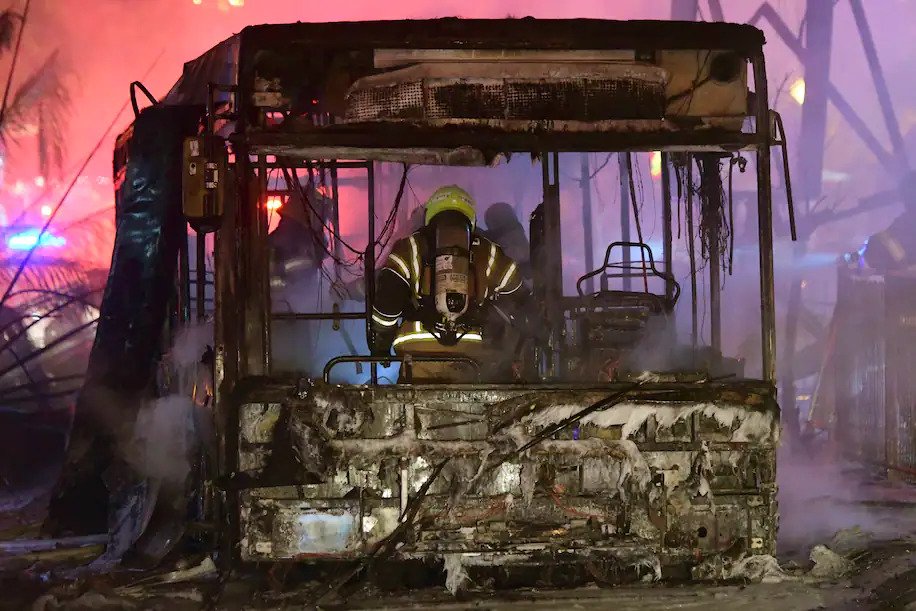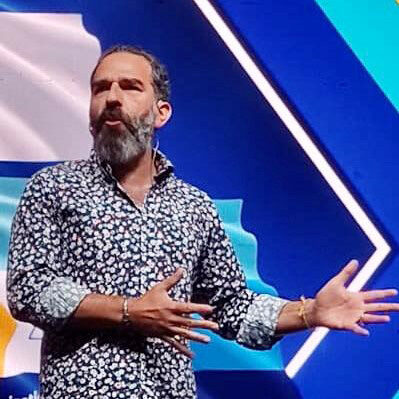
The Hamas rocket assault is bad for Palestinians and Israelis alike
TEL AVIV — When it started, we heard the children’s school was going virtual again that day. Coronavirus again? No, rockets — 250 had been fired into Israel from Gaza overnight. By that evening, we were in the bomb shelter, as rockets were flying to Tel Aviv. We’ve spent every night since in the bomb shelter. It seems as if Hamas deliberately targets Israel’s civilian population after dark, resulting in sleepless nights, adding a form of psychological terror to the rocket launches.
Our days and nights are full of wailing sirens, loud booms, obsessive news checks, check-ins with family and friends, and dark anticipation — anticipation for the next siren, anticipation of our home getting hit by a rocket, anticipation of what the next moment will bring. Every ambulance that passes, every car that honks, every motorcycle that passes, every sound that normally would not elicit a reaction leaves us startled.
As we hunker down in the bomb shelter, my three children routinely ask: “Abba, was that a siren?” (No, it was a motorcycle.) “Wait, what was that?” (Don’t worry, I’ll let you know if it’s a siren, and when it goes off, we’ll walk, we won’t run.) “What’s going to happen?” (Stay calm, we’ll be fine.) “Why is Hamas doing this?” (Because they don’t want us to live here.) “Will the sirens keep going off?” (Yes, there will be more, but don’t worry, we’ll be okay.) “Will you come with me to the bathroom?” (Yes, of course I will.)
What else can I say?
Though I make every attempt to comfort my children, I am fully aware of the risks. I am eternally indebted to Israel’s defensive Iron Dome, with approximately 10 to 15 batteries spread throughout the country. All it takes is one miss by the system, though, one direct hit to our home, and we are no longer. This campaign of terror has unleashed just over 3,300 Hamas rockets, and counting, targeting 70 percent of Israel. We are told the Iron Dome’s effectiveness is just about 90 percent, but that means many rockets have made it through. We have seen rockets fall in Ramat Gan in central Israel, cities and towns across Israel’s south, and most recently, a direct hit on a kindergarten in Sderot. Thankfully, it was closed.
Netanyahu didn’t start this Gaza crisis. But it could help keep him in power.
This is a reality I do not wish upon anyone, a constant existential threat for Israelis and Palestinians alike who are either dodging incoming Israeli airstrikes, or forced to stay put and die for the sake of Hamas’s gross PR campaign. For Palestinians living under Hamas’s oppressive rule, their existence and national aspirations have become a nightmare. After Israel withdrew from Gaza in 2005, Hamas took over the territory — beating innocent civilians, oppressing, even killing, anyone who dare speak against them. The result is horrifying. Palestinians do deserve to be freed, to realize their own aspirations, and given the opportunity to reach their greatest potential. With Hamas in charge, it’s not possible.
Yet, Israel, a democracy seeking peace (as it has solidified agreements with Arab countries including Egypt, Jordan, the United Arab Emirates and Bahrain) is always called out as the aggressor. “International outcries” have lost their effectiveness — after years of one-sided condemnation and heavy-handed resolutions, they fall on deaf ears for me and many people I know. At every given opportunity, world opinion immediately sides against my beloved Israel. Protests in Europe don’t faze me; a recent “pro-Palestinian” demonstration in London featured slogans such as “Rape their daughters” in the same breath as “Free Palestine.” I don’t care about what others will say anymore. What I care about is what others do to harm my existence.
As an open-minded citizen of the world, I personally seek to build bridges of understanding and opportunities for cultural and educational exchange. I don’t just want to know Palestinians, I want to understand Palestinians, and I want Palestinians to understand me.
But I will not die for it. I want to live, and I know most Israelis, Palestinians and humanity for that matter simply want the same. We want a world for our children that is better than the one we were handed. We want our children to have every opportunity to stand atop our shoulders and see beyond the cycle of violence, to see far beyond that which separates us and instead discover that which unites us, as human beings. I imagine a time when my children could go visit Gaza, and Palestinian children could visit Tel Aviv. We would build relationships based on mutual understandings, heal what is broken, and collaborate on educational cultural exchanges that would lead to building bridges of cooperation instead of tearing them apart.
Israel won the Israeli-Palestinian conflict. Any plan has to reflect that.
I imagine a world as it should be, although I am reminded of the world as it is. Nonetheless, I make every attempt in bridging the two, as the rockets keep flying overhead.
And I am not scared — I’m sad.
I’m not scared because I am prepared for this, I have been through this before, and I am still here. I’m sad because this campaign of terror, all the missiles launched at Israel, is for nothing. Nothing has — nor will — come out of this, not for Hamas, and certainly not for the average Palestinian who I have to believe wants to live.
I’m saddened by the fear instilled in all of our children, Israeli and Palestinian alike. This fear will serve as a reminder of all that is bad in our world, and it will scar them for a lifetime. How can we imagine a better world for them? How can we expect our children to imagine a better life if what they are taught is hate and the desire to kill?
Yet, I remain optimistic. I have to believe that we can all do better. I look forward to the world as it should be — all children deserve the opportunity to reach their greatest potential.

